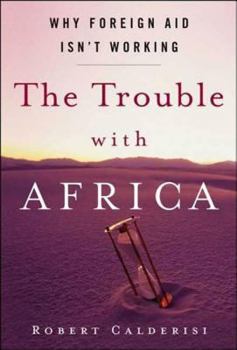The Trouble with Africa: Why Foreign Aid Isn't Working
Select Format
Select Condition 
Book Overview
After years of frustration at the stifling atmosphere of political correctness surrounding discussions of Africa, long time World Bank official Robert Calderisi speaks out. He boldly reveals how most of Africa's misfortunes are self-imposed, and why the world must now deal differently with the continent. Here we learn that Africa has steadily lost markets by its own mismanagement, that even capitalist countries are anti-business, that African family...
Format:Paperback
Language:English
ISBN:1403976511
ISBN13:9781403976512
Release Date:May 2007
Publisher:St. Martin's Griffin
Length:256 Pages
Weight:0.70 lbs.
Dimensions:0.7" x 6.0" x 8.9"
Customer Reviews
5 ratings
Credible, Pointed, Relevant, Useful, Essential
Published by Thriftbooks.com User , 15 years ago
I read in groups in order to avoid being "captured" or overly-swayed by any single point of view. The other books on Africa that I will be reviewing this week-end include: Dead Aid: Why Aid Is Not Working and How There Is a Better Way for Africa The Challenge for Africa Africa Unchained: The Blueprint for Africa's Future Up front the author stresses that since 1975 Africa has been in a downward spiral, ultimately losing HALF of its foreign market for African goods and services, a $70 billion a year plus loss that no amount of foreign aid can supplant. The corruption of the leaders and the complacency of the West in accepting that corruption is a recurring theme. If the USA does not stop supporting dictators and embracing corruption as part of the "status quo" then no amount of good will or aid will suffice. The author emphasizes the pettiness and egotism of African leaders, another recurring theme distinct from their corruption. He praises Nelson Mandela, Leopold Senghor of Senegal, and Julius Nyerere of Tanzania as wise men and models. He also emphasizes the need to eliminate monopolies, and I have for myself a note, "need to map monopolies--governmental and corporate as well as religious and tribal--down to the district level." Opening quote (p 7): "...most not ... aware that Africa has steadily lost markets by its own mismanagement; that most countries--including supposedly "capitalist" ones like the Ivory Coast--have been anti-business; that African family loyalty and fatalism have been more destructive than tribalism; that African leaders and intellectuals play intentionally on Western guilt; that even Africa's "new" leaders are indifferent to public opinion and key issues like AIDS; and that, in recent decades, Africans have probably been more cruel to each other than anyone else has been." The author is also optimistic, observing as so many have the richness of Africa in talent, resources, and tradition. In the author's view, aid works best when the government and society are already moderately effective, and a new approach for Africa might start with Uganda, Tanzania, Mozambique [this was written before the recent implosion of that country], Ghana, and Mail. He praises Botswana and Mauritius as success stories of lasting importance. I am reminded that four countries have 50% of Africa's population: Nigeria, Congo (CD), Ethiopia, and South Africa. Practical impediments to African develop identified by the author include a lack of deep-water ports (to which I would add multiple land-locked countries); a failure to achieve unity as a whole and even unity at the sub-region level--he spends time on the collapse of Central Africa. Highlights from this book, which "tells a story" in a very credible way and also improves my appreciation for the World Bank and the International Monetary Fund, both of which I have considered part of the problem for over a decade: + Home-grown corruption & despotism is the leading cause of decli
This tells the story....
Published by Thriftbooks.com User , 16 years ago
IF you want to get a great idea of the screwed up programs and screwed up governments of the continent, then read this book. The author does a great job descibing the situations and their historical significance. I learned a lot about Africa. He tells things people don't want to hear.
Excellent book
Published by Thriftbooks.com User , 17 years ago
This is not a whiteman look over Africa, but a very clever and clear understanding on the roots of the blocage based on ways of doing in Africa.I loved this book because Robert does not judge but gives pertinent observation based on experience at high level behind the corridors of the powers.Money loaned by westerners increased corruption instead of bringing releaf. This book points some clear responsabilities of who's doing what, and what is behind this huge mess on this continent.
Candid, brave, caring, & most importantly - relevant.
Published by Thriftbooks.com User , 17 years ago
Brilliant. Well-written. Superbly addresses the point (why foreign aid isn't working in Africa). Calderisi obviously cares very much - enough to say what needs to be said. I read this book a year ago and still remember it vividly, which attests to how succinctly Calderisi conveys important information.
The Trouble with Africa
Published by Thriftbooks.com User , 17 years ago
Having recently traveled to Africa for the first time, I left that continent, as did my fellow travelers, wondering what could be done to better the lives of the people we met. It seemed that the troubles were monumental, and that solutions would be nearly impossible. As I read Mr. Calderisi's book, I felt that here were the concrete, rational ideas that are needed to begin the transformation. It made me wish I had the expertise and leadership abilities to get started on it NOW and I only hope that in the very near future that someone with Mr. Calderisi's insight and knowledge will make this a priority and start implementing his ten ways of changing Africa. A truly thought-provoking and inspirational book.





